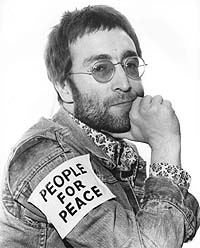Church school questioned after giving Lennon no marks
 The inclusiveness or otherwise of faith schools has come into the spotlight again after a Church of England school in Exeter, Devon, refused to allow John Lennon’s 1971 hit ‘Imagine’ to be featured in an end-of-term concert – because a teacher complained to the head that it was ‘anti-religious’.
The inclusiveness or otherwise of faith schools has come into the spotlight again after a Church of England school in Exeter, Devon, refused to allow John Lennon’s 1971 hit ‘Imagine’ to be featured in an end-of-term concert – because a teacher complained to the head that it was ‘anti-religious’.Geoff Williams, head teacher of St Leonard’s Primary School, denies press reports that he banned the song – which contains the line “Imagine there's no heaven... and no religion too.” But he admits that it was removed from the concert set list after being “deemed inappropriate”.
The school has ties with nearby St Leonard’s Church, a well-known conservative evangelical worship centre. Some parents at the school are reportedly unhappy with the decision.
Mr Williams declared: “We are a Church school and we believe God is the foundation of all that we do. We chose … to perform another song we had practised which better reflected the theme of Songs for A Green Earth.”
However, critics, including both Christians and humanists, say that the decision smacks of intolerance and belies the claims of faith schools to be open to people of all backgrounds and convictions.
Andrew Copson, education and public affairs officer at the British Humanist Association, told the BBC: “It seems a little cruel to prevent children from singing the song if they want to. This represents a degree of religious intolerance and does not take account of those parents who may not share the beliefs of the head and the governors.”
Simon Barrow, co-director of the UK Christian think tank Ekklesia, who lives in Exeter himself, said that the decision would “strike a lot of people as silly, and will hardly encourage the public to believe that church schools really are open to people of whatever background or persuasion.”
This week Canon John Hall, who is the Church of England’s chief education officer, criticised an article by Natasha Walter in the Guardian newspaper which suggested that church schools were divisive and quoted alleged instances of parents having to lie about their beliefs in order to get children into them.
Canon Hall, in a Guardian response column yesterday (20 June 2006), said that church schools were inclusive and multi-cultural, though they provided their services “within the context of Christian belief and practice.”
Critics say that, in practice, as in the case of John Lennon’s song at the Exeter C of E school, this often involves imposing an interpretation of one belief system on pupils with different convictions.
On the impact of selection by faith, Canon Hall wrote: “You can't judge the extent of it on the basis of a few anecdotes.” He went on: “Many Church of England schools admit a majority of pupils without any faith test.”
However the Church of England has so far been unable to produce any clear statistical data about the extent of faith-based selection in their schools, and has not indicated that it intends to do so.
Religion (or not) has become a hot topic in Britain’s schools. Christian groups repeatedly complain of anti-Christian bias in state schools, especially around major festivals like Christmas and Easter - notably the media-fuelled annual 'Winterval wars'.
Meanwhile secularists protest that Christian festivals are imposed on them, and advocates and opponents of a multi-faith approach dispute the presence or absence of particular provisions.
Says Ekklesia’s Simon Barrow: “What we need is a genuine level-playing field in education – a proper recognition of the needs of both religious and non-religious pupils, an inclusive approach to spiritual and moral development which encourages conversation between different life-stances, and an end to selection on the basis of religious affiliation in publicly funded schools.”
Ekklesia claims that the current debate is marred by the idea that being supportive or critical of ‘faith schools’ is seen as a matter of whether one is ideologically for or against religion. It points out that critics of such schools actually include a leading Jewish rabbi and Christian chaplains, and that they do so on theological not just social or political grounds.
“The other difficulty is special pleading”, says Barrow. “For example, Christians try to bar public cultural expressions they find offensive, but then church schools block a John Lennon song. Similarly, some secularists argue for free speech, but then want children who wear religious jewellery prevented from doing so.”
“We need a consistent approach which neither imposes nor prohibits religious or non-religious expression in public institutions – but which encourages positive engagement and better understanding,” he says.
http://www.ekklesia.co.uk/content/
news_syndication/article_
060721lennon.shtml

0 Comments:
Post a Comment
<< Home